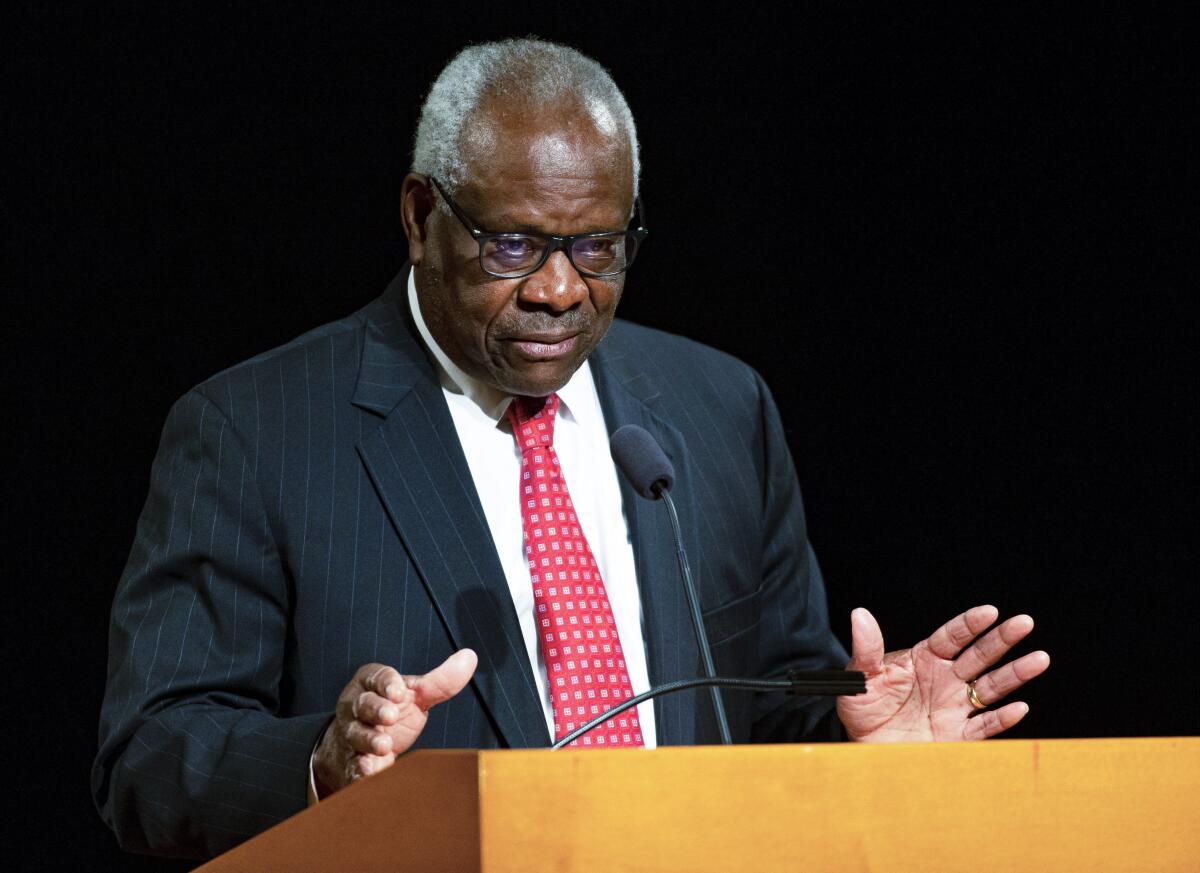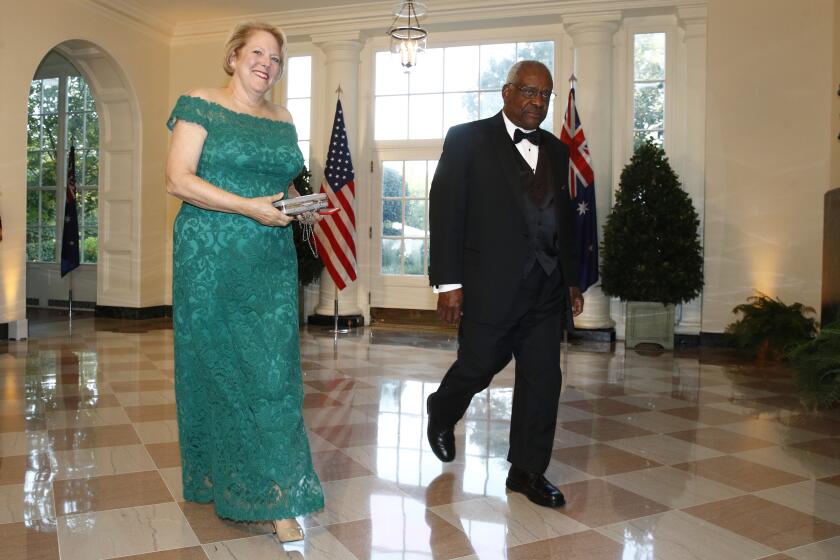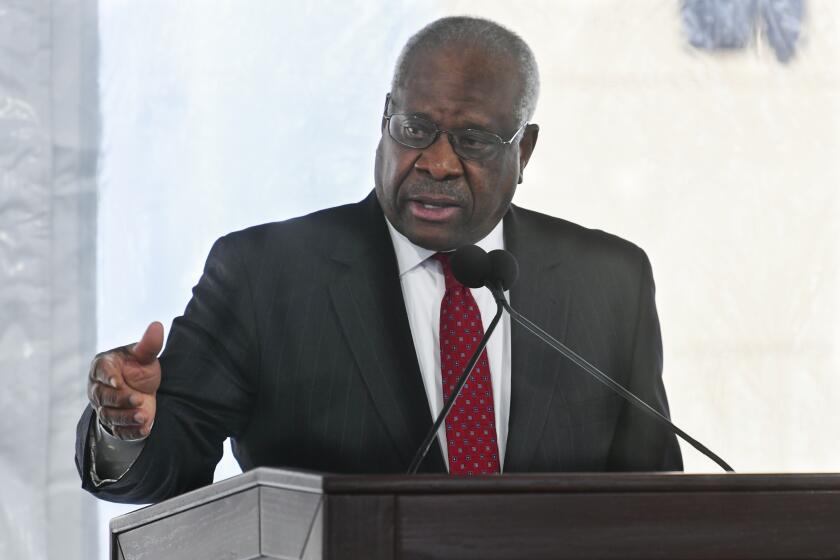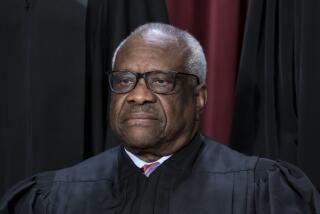Supreme Court Justice Clarence Thomas in the hospital: What we know

- Share via
WASHINGTON — Justice Clarence Thomas remains hospitalized in Washington after being found to have an infection, but he does not have COVID-19, the Supreme Court said Monday.
The high court announced Sunday evening that the 73-year-old justice had entered the hospital Friday after experiencing “flu-like symptoms” and underwent tests. The court said Thomas was found to have an infection and was being treated with intravenous antibiotics. The court said at the time that “his symptoms are abating,” but it did not say that Thomas had tested negative for the coronavirus.
During arguments at the court Monday, Thomas’ chair, to the right of Chief Justice John G. Roberts Jr., was empty, and Roberts took note of Thomas’ absence without explaining the reason for it. He said Thomas would take part in the cases based on written briefs and recordings of the in-court arguments. Thomas has been on the court since 1991 and is currently its longest-serving justice.
News of Thomas’ hospitalization came just before the Senate Judiciary Committee opened hearings Monday on the nomination to the court of Ketanji Brown Jackson, whom President Biden has named to replace retiring Justice Stephen G. Breyer. If confirmed, she would be the first Black woman on the court, but her confirmation would not change the ideological balance on the court. Thomas is the court’s second Black justice ever and one of six conservatives now on the court.
Several lawmakers and the White House wished Thomas a speedy recovery. Some questions and answers about Thomas’ hospitalization:
If it’s not COVID-19, what’s wrong?
The court provided no additional information about the infection that put Thomas in the hospital other than to say he was responding to intravenous antibiotics. There was no indication as to the seriousness of the infection or what caused it, but the court said Sunday evening that he was expected to be out of the hospital in a day or two.
One of the nation’s top authorities on judicial ethics calls the conduct of Ginni Thomas, the wife of Supreme Court Justice Clarence Thomas, ‘reprehensible.’
Thomas has no known health conditions, but justices make their own decisions about what health information to release and when. The court has said that all nine justices have received COVID-19 vaccinations and booster shots.
The court does occasionally release health and other information about various justices. Its website contains press releases going back to late 2002, including releases about health issues of other justices. Sunday’s news appeared to be the first time the court issued health information about Thomas in that way.
Is it odd the public didn’t immediately know Thomas was hospitalized?
No. The court offered no explanation for why Thomas’ hospitalization wasn’t disclosed earlier, but it’s not always apparent when justices are getting medical treatment.
For example, the late Justice Ruth Bader Ginsburg was fairly forthcoming about her many health issues over the years, including several bouts with cancer. But in 2020 she waited more than four months to reveal that her cancer had returned and that she was undergoing chemotherapy.
The justice who once went 10 years without asking a question during Supreme Court oral arguments now can’t quit talking.
That same year, Roberts spent a night in a hospital after he fell and suffered a cut on his forehead that needed stitches. The injury wasn’t disclosed until a month later, and then only because the Washington Post learned of it.
Now-retired Justice Anthony M. Kennedy was similarly mum. In 2005 he said nothing publicly when he had a stent inserted to keep an artery open after experiencing mild chest pain. The court only revealed the procedure when Kennedy returned to the hospital to have the stent replaced 10 months later.
Is it the first time a justice has missed arguments but still voted on a case?
No, and there are other recent examples. At the beginning of 2019, when Ginsburg was recovering from cancer surgery, she missed arguments but participated in decisions based on the briefs and transcripts of the arguments. She ultimately missed six days on which the court heard a total of 11 arguments and returned to the courtroom for arguments the following month.
In 2004 and 2005, then-Chief Justice William H. Rehnquist was suffering from thyroid cancer and was not on the bench for 44 arguments over five months. Rehnquist voted in most of the cases for which he did not attend the arguments.
Could Thomas have still participated in arguments from the hospital?
Theoretically, yes. Other justices have participated in arguments remotely since the court started its term in the fall and some lawyers have as well. Justice Brett M. Kavanaugh participated remotely from his home after testing positive for the coronavirus, and Justice Sonia Sotomayor participated remotely from her office when coronavirus case counts were particularly high. Justice Neil M. Gorsuch also participated remotely after getting what the court described as a “stomach bug” but testing negative for the coronavirus.
Start your day right
Sign up for Essential California for the L.A. Times biggest news, features and recommendations in your inbox six days a week.
You may occasionally receive promotional content from the Los Angeles Times.
For whatever reason, Thomas isn’t doing that. If he had, however, he wouldn’t have been the first justice to participate in arguments from a hospital. Ginsburg participated remotely from Johns Hopkins Hospital in Baltimore in 2020 while hospitalized with an infection caused by a gallstone. At the time, all the justices were participating remotely, and the court was hearing arguments by phone because of the COVID-19 pandemic.
The justices returned to in-person arguments in October after more than a year and a half of telephone arguments. The courtroom is still closed to the public, however, because of the pandemic.
More to Read
Sign up for Essential California
The most important California stories and recommendations in your inbox every morning.
You may occasionally receive promotional content from the Los Angeles Times.












